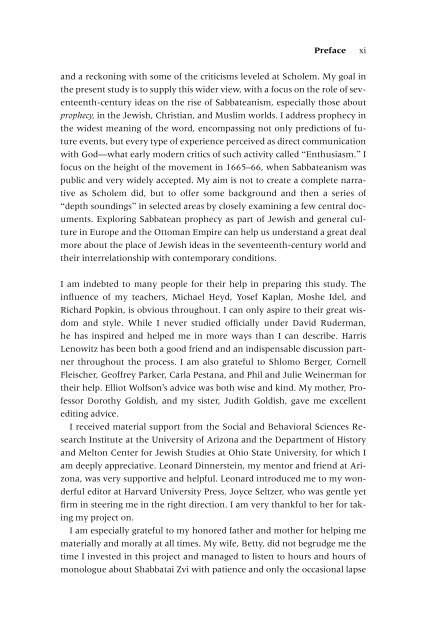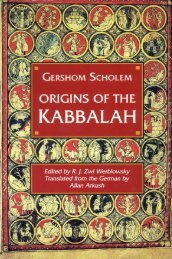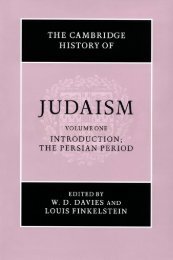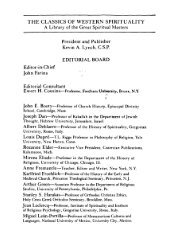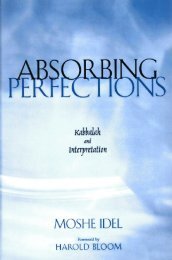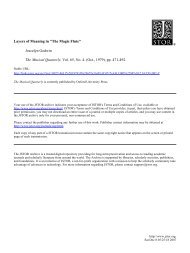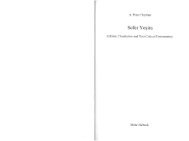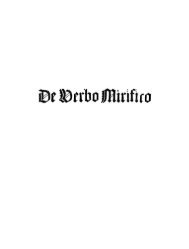Create successful ePaper yourself
Turn your PDF publications into a flip-book with our unique Google optimized e-Paper software.
Preface<br />
xi<br />
and a reckoning with some of the criticisms leveled at Scholem. My goal in<br />
the present study is to supply this wider view, with a focus on the role of seventeenth-century<br />
ideas on the rise of <strong>Sabbatean</strong>ism, especially those about<br />
prophecy, in the Jewish, Christian, and Muslim worlds. I address prophecy in<br />
the widest meaning of the word, encompassing not only predictions of future<br />
events, but every type of experience perceived as direct communication<br />
with God—what early modern critics of such activity called “Enthusiasm.” I<br />
focus on the height of the movement in 1665–66, when <strong>Sabbatean</strong>ism was<br />
public and very widely accepted. My aim is not to create a complete narrative<br />
as Scholem did, but to offer some background and then a series of<br />
“depth soundings” in selected areas by closely examining a few central documents.<br />
Exploring <strong>Sabbatean</strong> prophecy as part of Jewish and general culture<br />
in Europe and the Ottoman Empire can help us understand a great deal<br />
more about the place of Jewish ideas in the seventeenth-century world and<br />
their interrelationship with contemporary conditions.<br />
I am indebted to many people for their help in preparing this study. <strong>The</strong><br />
influence of my teachers, Michael Heyd, Yosef Kaplan, Moshe Idel, and<br />
Richard Popkin, is obvious throughout. I can only aspire to their great wisdom<br />
and style. While I never studied officially under David Ruderman,<br />
he has inspired and helped me in more ways than I can describe. Harris<br />
Lenowitz has been both a good friend and an indispensable discussion partner<br />
throughout the process. I am also grateful to Shlomo Berger, Cornell<br />
Fleischer, Geoffrey Parker, Carla Pestana, and Phil and Julie Weinerman for<br />
their help. Elliot Wolfson’s advice was both wise and kind. My mother, Professor<br />
Dorothy Goldish, and my sister, Judith Goldish, gave me excellent<br />
editing advice.<br />
I received material support from the Social and Behavioral Sciences Research<br />
Institute at the University of Arizona and the Department of History<br />
and Melton Center for Jewish Studies at Ohio State University, for which I<br />
am deeply appreciative. Leonard Dinnerstein, my mentor and friend at Arizona,<br />
was very supportive and helpful. Leonard introduced me to my wonderful<br />
editor at Harvard University Press, Joyce Seltzer, who was gentle yet<br />
firm in steering me in the right direction. I am very thankful to her for taking<br />
my project on.<br />
I am especially grateful to my honored father and mother for helping me<br />
materially and morally at all times. My wife, Betty, did not begrudge me the<br />
time I invested in this project and managed to listen to hours and hours of<br />
monologue about Shabbatai Zvi with patience and only the occasional lapse


